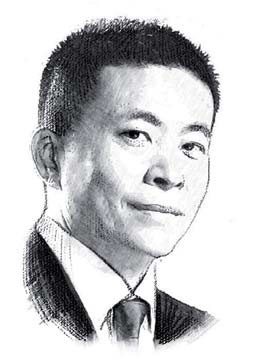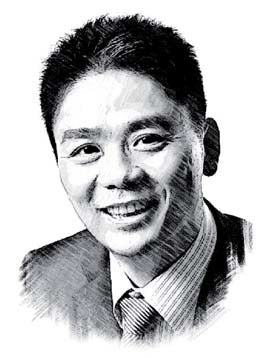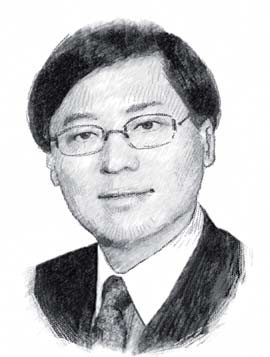Intertwining with traditional sectors to be key

Q1. What role is the Internet likely to play in China's next Five-Year Plan (2016-20) during the economy's new normal phase of slower, more sustained growth?
Q2. China aims to become a world leader in Internet technology. In what spheres do you think the country is particularly well placed to achieve this goal? What skills that China excels in do you think could be exploited to this end? What is the biggest hurdle that stands in the way of China achieving its goal?
Q3. Which particular industry do you think is going to be "shaken" by the Internet, or which area do you find the most promising to apply the government action plan of Internet Plus?
Q4. In China's Internet sector are there any areas (such as cross-border e-commerce, video or gaming) that you expect to do particularly well in the coming years?

Charles Chao, CEO and chairman of the board of Sina Corp, China's online media company
A1 We are aware that, in recent years, China's economic growth is going through a transition to be more innovation-driven, which largely depends on the Internet as an infrastructure to improve the operational efficiency of the entire society. Among the five fundamental concepts of the new Five-Year Plan, three of them, namely, innovation, openness, and sharing, fit perfectly in with the nature of the Internet. So there's no doubt that the Internet is playing a much more important role, however it doesn't mean the Internet companies are going to play the role by themselves. It is more about applying Internet technology to improve and upgrade traditional industries and to create a brand new business ecosystem.
A2 In the era of mobile Internet, China has been developing very fast in the Internet technology area and has demonstrated its strength especially in terms of applications. There is one particular advantage China has, which is the large base of the Internet population. Scale can largely decide the sophistication of technology. For example, on New Year's Eve, Weibo handles tens of thousands of posts in one second. Very likely, we are going to see quite a number of breakthroughs in mobile Internet technology take place in China due to its giant user base with massive requests.
A3 The Internet reshapes traditional industries by improving efficiency with data and information. In theory, industries that are less dependent on logistic systems or providing non-physical products, and industries in which one party has more or better information than others are the ones that have the most potential to be redefined by Internet Plus. The Internet provides possibilities for many innovations like online financing, electronic payment, crowd funding and crowd sourcing.
A4 The so-called sharing economy will continue to thrive because it is much more than hailing a car or renting an apartment from those who have idle assets. Any areas that can match demand with supply can adopt this model. And in the era of the mobile Internet, we think the other promising business is mobile video. We've witnessed an explosive development of short videos. Daily video views on Weibo in September this year surged 9.7 times compared with the same period last year. I think the growth of short videos will continue to be strong in the coming year.

Liu Qiangdong, CEO of JD.com Inc, China's largest online direct sales company
A1 China's economy has entered the phase of the new normal. To smoothly make it through the transition period and change the powerhouse of the economy from export-driven to consumption-driven requires strong and sustained power.
Internet Plus represents the new direction of China's economic development.
JD.com has also set up its own Internet Plus strategy. We will integrate the Internet into four areas: community-based service, agriculture, finance and trade. Through further developing this strategy and cooperating with traditional companies, we hope to bring a prosperous future for both online and offline businesses and drive the upgrade of China's consumption market to be high-end.
A2 China has overtaken the United States in becoming the world's largest e-commerce market. Online retail transactions account for about 12 percent of total retail transactions in China and that keeps growing. With China's economy transforming to be more consumption-driven, the e-commerce industry will see a rosy future. The challenges in e-commerce include the protection of intellectual property rights and a level playing field.
A3 The Internet industry and traditional industry are interdependent rather than enemies. Without the Internet, traditional industries will gradually lose their vitality. But without the manufacturing industry, the Internet economy is no more than castles in the air.
In my opinion, the Internet cannot change the basic principles of how business works. What the Internet can do is to improve production and operational efficiency. The model of retail has evolved from brick-and-mortar marketplaces to supermarkets to e-commerce, which is driven by lower costs and improved efficiency in the supply chain.
A4 The most promising areas in China's economy are traditional sectors rather than the Internet sector. For example, in the clothing and footwear industry, there is a possibility some Chinese companies will emerge to become popular fast fashion brands. In the food and drink industry, I think in the coming five years there will also be some food brands that earn the trust of Chinese consumers. JD.com will work hard to directly sell more clothes and shoes online in 2016 to lower the costs of the entire industry.

Cheng Wei, CEO of Didi Kuaidi, China's largest mobile-based car-on-demand service provider
A1 The new Five-Year Plan gives priority to the nurturing of an economy of sharing in the interest of an organic integration between Internet technology and socio-economic development. TMT enterprises are enjoying great opportunities of accelerated growth thanks to surging support from both the policy sphere and the capital market.
Nevertheless, the Internet in itself should be a structure of new inter-relations among things in our life: like WeChat connects people, Didi connects people to cars in a better, more efficient way of resource allocation.
A2 China is now the second pole in global Internet-based innovation where strong policy incentives and surging inflows of capital are fueling tremendous growth in the high-tech area. In this context, the new inspirations from the realm of sharing and interconnection are creating new spaces for collaboration between businesses.
The new tides of mobile technology and the sharing economy will be great drivers to our continuous innovation in places we've never dreamt of going before - and for that we need to make sure we always make adequate investments in technology and talent.
A3 The revolution in ways of life is unfolding before our eyes everyday - how do we clothe ourselves, feed ourselves, shelter ourselves and move ourselves around Every attempt to answer those questions will uncover countless bottlenecks but also unprecedented opportunities. The closer we get to areas of essential human needs, the greater the space for change and innovation, for instance in healthcare and education.
A4 The Internet sphere goes through a serial transformation: from information, to consumption to service. Its application will go ever deeper and broader as technology advances, into every corner of social life, into the very roots of human collective existence, such as healthcare. Cloud- and big data-based transportation and self-driving will no doubt remain a hotbed for technological progress, with profound impacts on urban planning and civil life. Didi will continue to build on its focus on transportation to become a one-stop gateway to comprehensive mobility solutions and ever better user experience.

Yang Yuanqing, Chairman and CEO of Lenovo Group Ltd
A1 According to China's 13th Five-Year Plan (2016-20), the nation encourages the development of the Internet economy and the government has adopted the Internet Plus strategy to push cyber-based innovation in various areas, including business models, logistics and supply chains. The Internet will become a major driving force in the next five years. In the information era, the Internet will be one of our core competitiveness areas, as it connects every industry. A company can take advantage of modern technology to reform its traditional business models. In all, the Internet industry will boost the Chinese economy and social development.
A2 The combination of the Internet and traditional economic sectors will lift China as a strong power in the Internet era. The overall picture of the Chinese economy is positive. Premier Li Keqiang has been advocating entrepreneurship and innovation in startups. The government has also issued policies to encourage industrial reform and upgrades by integrating with the Internet. If we leverage Internet technology to take advantage of traditional economic sectors, it will help speed up the country's economic growth.
A3 The Internet is a critical tool for companies to upgrade their businesses. Internet companies have been deeply integrated in industry but some traditional companies have yet to fully embrace this trend. As long as traditional businesses arm themselves with Internet technologies, I am sure they will stand a better chance in future competition.
A4 Opportunities are everywhere. Chinese companies should build their competitiveness and speed up reform. Lenovo will focus on a few core business units such as PCs, mobility, and cloud and enterprise products.
In the mobile segment, first, we are expanding emerging markets outside China.
(China Daily European Weekly 12/18/2015 page18)
Today's Top News
- New engine powers cargo drone expansion
- China to boost intl cooperation on green tech
- Factory activity sees marginal improvement in November
- Venezuela slams US' 'colonial threat' on its airspace
- Xi: Strengthen cyberspace governance framework
- Takaichi must stop rubbing salt in wounds, retract Taiwan remarks






























